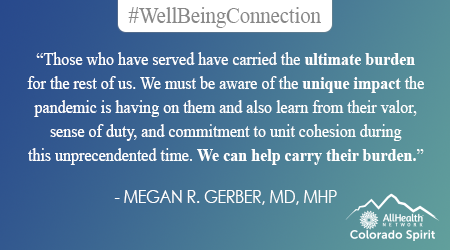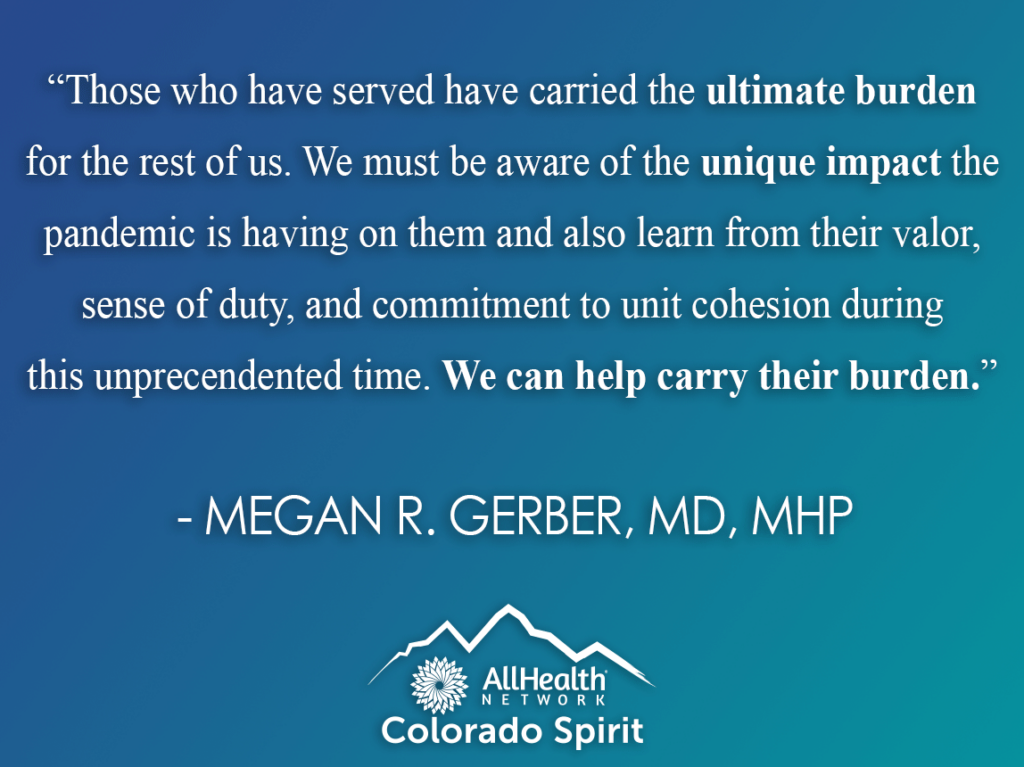One of our executive leaders recently shared this message with our entire agency. “We owe you many thanks, but more importantly, we owe you our freedom. There is no way to fully thank our Veterans for everything you sacrifice for the peace we experience on a daily basis, but we have to try!” For me this brought a flood of questions. How do we thank those who have and continue to serve in the US military? How do we support them? Saying thank you is certainly a step, but we all know that is not sufficient. Our military members give so much of themselves, how can we show appreciation for this and give back?
Recently a Colorado Spirit partner at the state shared with me there are 403,327 veterans in Colorado and 48,087 Active and Reserve Members. If we assume that those 451,414 military members impact at least six civilians each (on average), we can assume that at least 2,708,484 people are impacted by the military in the state of Colorado. Knowing that Colorado’s 2020 population is about 5.8 million, almost half of us in Colorado have a connection with a member of the military. In my mind, this means most of us have the opportunity to be a support to the military community. We wanted to take a moment today to share some resources. Whether you are a past or current member of the US military or you are connected with a member of the military, we hope these tips and resources can be helpful.
In times of stress, connecting with people is crucial. We also often find comfort in connecting with others whose stories and experiences feel similar to ours. There can be a great power in not having to explain your story and knowing that the person you are speaking with just gets it! If we want to be a support for our loved ones, we need to recognize that sometimes they don’t want to tell us what they are burdened by. Helping them find people who have similar lived experiences is sometimes the most helpful thing we can do. Real Warriors and Military OneSource , and many other groups offer not only resources but also opportunities to connect with others who have military experience.
Sometimes it is helpful to focus on actions and doing as opposed to talking. There are many free apps that can help with stress management, mindfulness skills, and PTSD symptoms. The VA has a list of apps here . Click on any app on this list and get more information about what the app can help with and who developed it.
If you want to offer support to someone in your life, reach out to them. As the National Center for PTSD shares, “Helping others and providing support can make a difference for someone who is having a difficult time. There are simple ways to talk with others that show support.” There are many different ways to show empathy and care to others, see the National Center for PTSD for some suggestions.
Recognize that the stress of the pandemic might stir up past difficulty and trauma for our loved ones. In this article Dr. Megan Gerber shares her experience speaking with a Vietnam Veteran who said the pandemic reminds him of his time in Vietnam. Dr. Gerber shared her insight that “In this pandemic with its necessary social distancing, our Veterans carry burdens accumulated during prior military service, including the enduring emotional weight of combat and other service-related traumas, along with physical health sequelae and chronic medical conditions that may put them at heightened risk for complications of COVID-19. Their military service has rendered them simultaneously vulnerable and strong; resilient in this time of crisis, they have much to teach us.” Normalizing this for our loved ones, offering a listening and supportive ear, recognizing their strength and resilience, and helping them connect with other support, including professional support if needed, are ways we can be there for them.
For all of you who support our military community, Thank You! We know that in times of stress, it is natural to turn to our known and natural networks. That means your loved ones are much more likely to seek connection with you as opposed to strangers. And, it takes support to be a support. If there is support we can provide you, please reach out.
In closing, while it is not nearly enough, the entire Colorado Spirit team extends their thanks and appreciation to our military community members. You do so much for so many. If there is ever any support we can provide, it would be an honor to connect.
Would speaking to someone help?
To speak with someone in the Colorado Spirit Program about stress related to the pandemic, please call 720-707-6789 or visit our web page at www.allhealthnetwork.org/Colorado-Spirit
For information about other services at AllHealth Network or to get connected with ongoing behavioral health support, please call: 303-730-8858.
AllHealth Network is continuing to provide service via telehealth or by phone and our Crisis Walk-in Center remains open 24/7. To learn more about what other community mental health centers are doing, please visit The Colorado Behavioral Health Council COVID-19 website.
If you are experiencing a mental health crisis and are in need of immediate assistance, please call the Colorado Crisis Hotline at 1-844-493-TALK (8255) or text TALK to 38255


